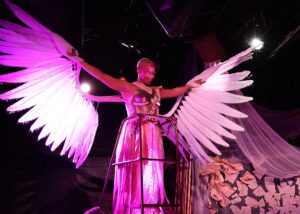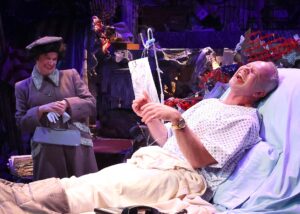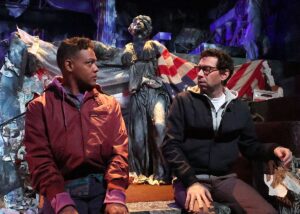Here’s the thing about Perestroika, the three-and-a-half-hour second half of Tony Kushner’s Angels in America: it’s a period piece, set in 1986, when the AIDS epidemic was spreading its lethal wings. And although it stands alone as a great play, it’s only part of Kushner’s epic masterpiece and has to be seen in context.

The Tony-winning original Broadway production of Angels in America, with the two parts in repertory, opened in 1993 (three years before the pharmaceutical “cocktail” that tamed the epidemic). The Provincetown Theater revived Part I: Millennium Approaches last May. It was an exceptional feat for a community theater, thanks to David Drake, the company’s artistic director, and now Drake and his entire cast have returned with Part II. Given the extraordinary success of last year’s production, expectations were high for Perestroika — and those expectations have been met and exceeded.
As a period piece, Kushner’s play is quite a different experience than it was three decades ago. For the audience, there’s less urgency about HIV. The right-wing politics of the Reagan era look almost beneficent compared to the mortal threat Trump poses to democracy and human rights and well-being. But Kushner’s focus has always been the crisis of faith suffered by the play’s characters and their need for healing and transcendence. That’s something that remains powerful no matter what the era. And the laughs — yes, plenty of them, despite the bitterness of this dark fantasia — are as strong as ever. What’s more, the theatrical language and flourish haven’t aged a bit.

In Millennium Approaches, we are introduced to Prior Walter, a Mayflower descendant living in New York City who is diagnosed with AIDS. Prior’s boyfriend, Louis, a left-wing Jew who likes to argue politics, leaves him, too cowardly to face Prior’s illness. Meanwhile, Joe Pitt, a closeted Mormon law clerk, looks to right-wing power broker Roy Cohn as a mentor. Roy, like Prior, is diagnosed with AIDS, but he hushes it up and refuses to accept his fate. Joe’s wife, Harper, feeling neglected, is having a mental breakdown. Joe’s mother, Hannah, arrives from Salt Lake City to mend their marriage and ends up with a job at the Mormon welcome center in Manhattan. Then Joe meets Louis and falls for him. When Roy ends up in the hospital, his night nurse is Belize, a flamboyant friend of Prior’s. And so, the polar pairs in this web of relationships come into full conflict. Finally, Prior, in his bed, is visited by an angel.

In Perestroika, those conflicts play out. When Louis realizes Joe is a Mormon, a law clerk, and a protégé of Roy Cohn’s, he rejects him and tries to return to Prior. Hannah, Joe’s mother, meets Prior and helps him in his search for the angel. Harper, her craziness under control, realizes that Joe can’t fulfill her needs and strikes out on her own. Roy, in the hospital, spars with the ghost of Ethel Rosenberg. He obtains a batch of the experimental drug AZT and has Belize administer it to him secretly. And Prior journeys to heaven to make his case to God through the angels.

In this new production of Perestroika, the actors reprising their roles from Millennium Approaches have honed their performances, all of them improved. (Which is saying something: they were all splendid last year.) Those that were low-key — Todd Flaherty’s Prior and Devon Kendall-Jacobs’s Belize — are smoother, warmer, and funnier. The intense and poignant Pitts — Nick Wilson’s Joe; Laura Scribner’s Hannah, and Danica Jensen’s Harper — are subtler in their human frailty and recognition of reality. Karl Gregory’s Louis does less pontificating and more self-deprecating, and his comic timing is sharper than ever. Scribner’s Ethel Rosenberg offers a master class in deadpan restraint, after some lightning-fast costume changes from playing Hannah. Joe MacDougall’s Roy Cohn, a standout last year, is even wilier and less bombastic, more chilling in his decline. And Darlene Van Alstyne, as the Angel that guides Prior (among other characters), is elegant and arresting.
The biggest change is the stage itself. Though David Drake’s direction is once again masterful and fluidly paced, the set, by designers Jenni Baldwin and Shannon Robert, is more compact, with multiple levels in one corner of the theater, and anything but stark in the way that Ellen Rousseau’s set was in Millennium Approaches. Instead, the theater is plastered with detritus, a junk-strewn ruin that seems to extend from the Bethesda Fountain in Manhattan’s Central Park to the crack paradise of Alphabet City. The feeling is that of a world rising from the ashes of war. It’s especially apt for the play’s touching coda, which follows Prior’s testimony in heaven.

Perestroika marks the conclusion of a fantastic journey — from the depths of hell to the mix of wisdom and regret that is tragic reality. Kushner’s play, and now Drake’s Provincetown production, are a theatrical gift that keeps on giving. It’s around for two more weekends and not to be missed.
Heaven’s Gate
The event: Angels in America, Part II: Perestroika, by Tony Kushner
The time: Through May 25, Thursday through Saturday at 7 p.m.; Sunday at 2 p.m.
The place: Provincetown Theater, 238 Bradford St.
The cost: $57.80, including fees



